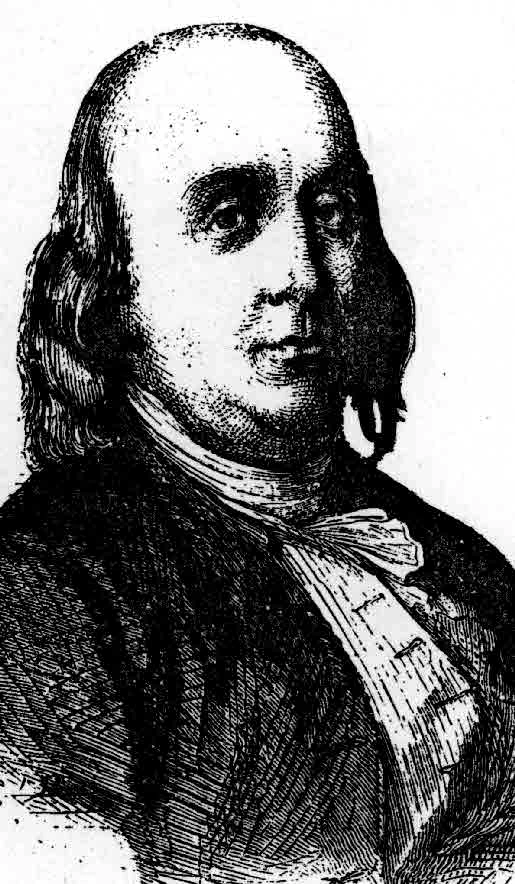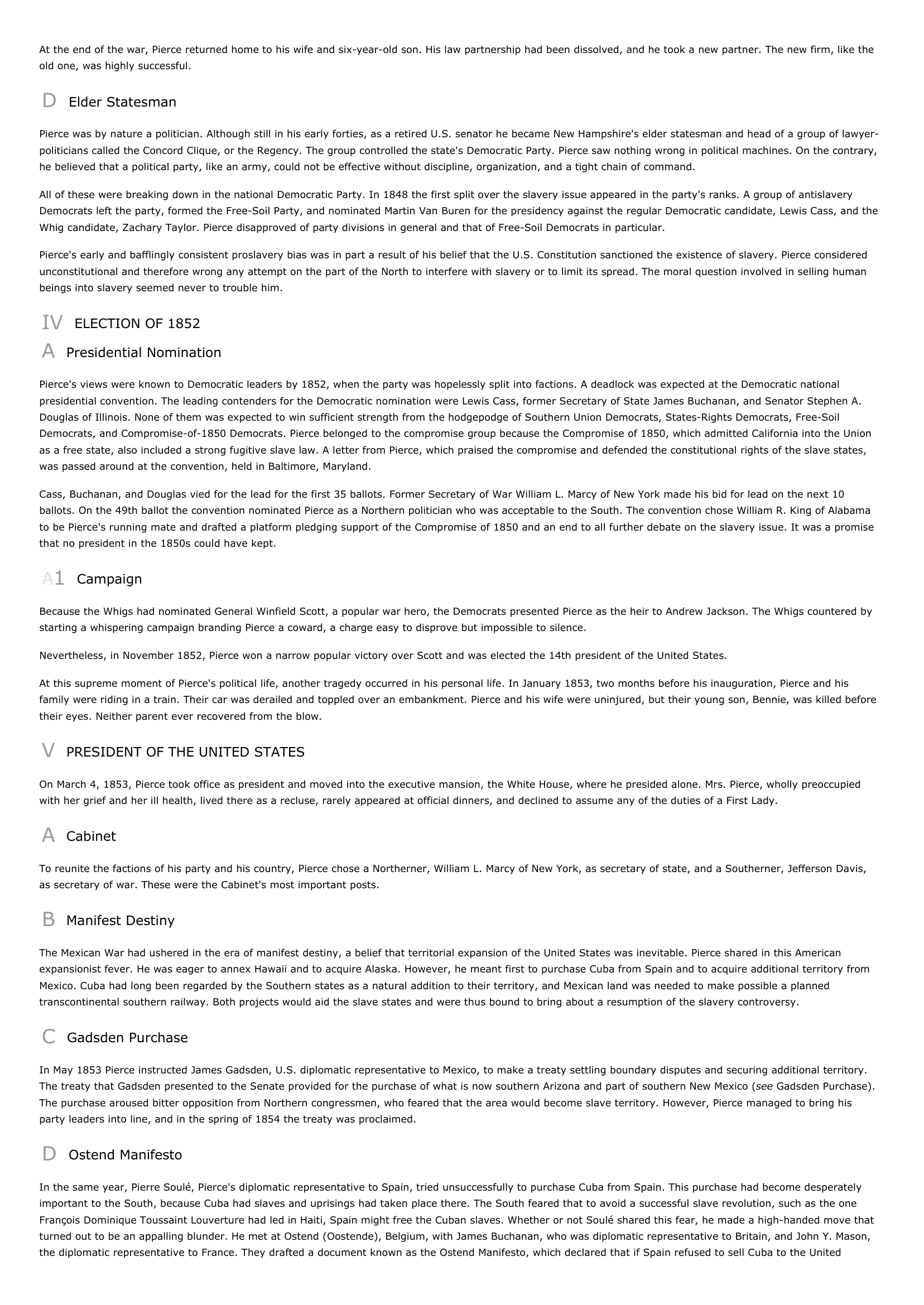Franklin Pierce.
Publié le 10/05/2013

Extrait du document


«
At the end of the war, Pierce returned home to his wife and six-year-old son.
His law partnership had been dissolved, and he took a new partner.
The new firm, like theold one, was highly successful.
D Elder Statesman
Pierce was by nature a politician.
Although still in his early forties, as a retired U.S.
senator he became New Hampshire's elder statesman and head of a group of lawyer-politicians called the Concord Clique, or the Regency.
The group controlled the state's Democratic Party.
Pierce saw nothing wrong in political machines.
On the contrary,he believed that a political party, like an army, could not be effective without discipline, organization, and a tight chain of command.
All of these were breaking down in the national Democratic Party.
In 1848 the first split over the slavery issue appeared in the party's ranks.
A group of antislaveryDemocrats left the party, formed the Free-Soil Party, and nominated Martin Van Buren for the presidency against the regular Democratic candidate, Lewis Cass, and theWhig candidate, Zachary Taylor.
Pierce disapproved of party divisions in general and that of Free-Soil Democrats in particular.
Pierce's early and bafflingly consistent proslavery bias was in part a result of his belief that the U.S.
Constitution sanctioned the existence of slavery.
Pierce consideredunconstitutional and therefore wrong any attempt on the part of the North to interfere with slavery or to limit its spread.
The moral question involved in selling humanbeings into slavery seemed never to trouble him.
IV ELECTION OF 1852
A Presidential Nomination
Pierce's views were known to Democratic leaders by 1852, when the party was hopelessly split into factions.
A deadlock was expected at the Democratic nationalpresidential convention.
The leading contenders for the Democratic nomination were Lewis Cass, former Secretary of State James Buchanan, and Senator Stephen A.Douglas of Illinois.
None of them was expected to win sufficient strength from the hodgepodge of Southern Union Democrats, States-Rights Democrats, Free-SoilDemocrats, and Compromise-of-1850 Democrats.
Pierce belonged to the compromise group because the Compromise of 1850, which admitted California into the Unionas a free state, also included a strong fugitive slave law.
A letter from Pierce, which praised the compromise and defended the constitutional rights of the slave states,was passed around at the convention, held in Baltimore, Maryland.
Cass, Buchanan, and Douglas vied for the lead for the first 35 ballots.
Former Secretary of War William L.
Marcy of New York made his bid for lead on the next 10ballots.
On the 49th ballot the convention nominated Pierce as a Northern politician who was acceptable to the South.
The convention chose William R.
King of Alabamato be Pierce's running mate and drafted a platform pledging support of the Compromise of 1850 and an end to all further debate on the slavery issue.
It was a promisethat no president in the 1850s could have kept.
A1 Campaign
Because the Whigs had nominated General Winfield Scott, a popular war hero, the Democrats presented Pierce as the heir to Andrew Jackson.
The Whigs countered bystarting a whispering campaign branding Pierce a coward, a charge easy to disprove but impossible to silence.
Nevertheless, in November 1852, Pierce won a narrow popular victory over Scott and was elected the 14th president of the United States.
At this supreme moment of Pierce's political life, another tragedy occurred in his personal life.
In January 1853, two months before his inauguration, Pierce and hisfamily were riding in a train.
Their car was derailed and toppled over an embankment.
Pierce and his wife were uninjured, but their young son, Bennie, was killed beforetheir eyes.
Neither parent ever recovered from the blow.
V PRESIDENT OF THE UNITED STATES
On March 4, 1853, Pierce took office as president and moved into the executive mansion, the White House, where he presided alone.
Mrs.
Pierce, wholly preoccupiedwith her grief and her ill health, lived there as a recluse, rarely appeared at official dinners, and declined to assume any of the duties of a First Lady.
A Cabinet
To reunite the factions of his party and his country, Pierce chose a Northerner, William L.
Marcy of New York, as secretary of state, and a Southerner, Jefferson Davis,as secretary of war.
These were the Cabinet's most important posts.
B Manifest Destiny
The Mexican War had ushered in the era of manifest destiny, a belief that territorial expansion of the United States was inevitable.
Pierce shared in this Americanexpansionist fever.
He was eager to annex Hawaii and to acquire Alaska.
However, he meant first to purchase Cuba from Spain and to acquire additional territory fromMexico.
Cuba had long been regarded by the Southern states as a natural addition to their territory, and Mexican land was needed to make possible a plannedtranscontinental southern railway.
Both projects would aid the slave states and were thus bound to bring about a resumption of the slavery controversy.
C Gadsden Purchase
In May 1853 Pierce instructed James Gadsden, U.S.
diplomatic representative to Mexico, to make a treaty settling boundary disputes and securing additional territory.The treaty that Gadsden presented to the Senate provided for the purchase of what is now southern Arizona and part of southern New Mexico ( see Gadsden Purchase). The purchase aroused bitter opposition from Northern congressmen, who feared that the area would become slave territory.
However, Pierce managed to bring hisparty leaders into line, and in the spring of 1854 the treaty was proclaimed.
D Ostend Manifesto
In the same year, Pierre Soulé, Pierce's diplomatic representative to Spain, tried unsuccessfully to purchase Cuba from Spain.
This purchase had become desperatelyimportant to the South, because Cuba had slaves and uprisings had taken place there.
The South feared that to avoid a successful slave revolution, such as the oneFrançois Dominique Toussaint Louverture had led in Haiti, Spain might free the Cuban slaves.
Whether or not Soulé shared this fear, he made a high-handed move thatturned out to be an appalling blunder.
He met at Ostend (Oostende), Belgium, with James Buchanan, who was diplomatic representative to Britain, and John Y.
Mason,the diplomatic representative to France.
They drafted a document known as the Ostend Manifesto, which declared that if Spain refused to sell Cuba to the United.
»
↓↓↓ APERÇU DU DOCUMENT ↓↓↓
Liens utiles
- Franklin Pierce - Biography.
- Franklin Pierce
- Pierce, Franklin
- Franklin Pierce
- MÉMOIRES de Franklin - résumé, analyse


